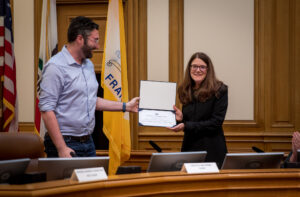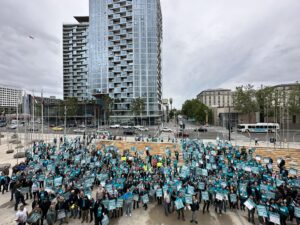At the October Delegate Assembly, Local 21 members and staff alike were reminded that Every Member Counts.
On Oct. 17, over 100 member delegates convened at the Marriott Hotel’s Convention Center in downtown Oakland to discuss recruitment strategies, tech diversity, Union finances, and to graduate the first class of Member Activists (MAs) from the pilot steward training program.
At the assembly, Alex Tonisson, L21 Director of Field Services spurred delegates to contemplate Building Our Membership by encouraging them to discuss ways to start the conversation at their workplaces on the benefits of unions.
However, Tonisson’s presentation reminded the assembly that we still have a long way to go.
While the private sector is enjoying renewed job growth – albeit unevenly across socio-economic segments of the population — IT workers, auditors, analysts, engineers and software developers in city and county departments have taken a hit from the recession that we have not yet recovered from, where job loss continues to be a problem. While the private sector has added more than 3.5 million jobs, the public sector has lost 750,000 jobs since the economic downturn.
“Most of you are doing more with less staff,” Tonisson told the members in attendance at the assembly.
The reason for this, he added, is a political backlash against public sector unions.
Public employees have taken the brunt of scapegoating from the Far Right, particularly blaming unions for government deficits and inefficiency in states across the country. Moreover, “Right to Work” legislation across the country could further serve as a barrier to organizing workers and union representation in the public sector. California could soon follow the trend of already half the states in the union who have succumbed to local anti-union legislation.
On that note, Tonisson reiterated the importance more than ever of strengthening public employees’ economic future and political voice, and to do that, we need numbers.
“High membership is very important to any healthy union,” Tonisson said. “More members means the employer sees the union has the support of the employees. It also means that the union is more democratic, addressing the issues most important to the membership as a whole. A stronger union has more resources to bargain, do research, have input in politics, policy and legislation and individual member representation.”
Following Tonisson’s presentation, the delegates moved into several breakout groups to focus on questions like: “What common issues are important to co-workers?” and “How do we help co-workers see the connection between those issues and being members of a strong union?”




Afterwards, the delegates reconvened in the conference room. Some went up to the mic to summarize the conclusions they reached during the breakout sessions. Their answers to the breakout questions were based on concerns they have heard from coworkers. Along these lines, members offered suggestions as to what the Union can do to address these concerns, ranging from healthcare, pay, benefits, to tough supervisors. Delegates also exchanged ideas on how to start conversations at their workplaces with non-organized colleagues about how joining the Union can benefit them. “Obviously, this organizing strategy is easiest with people you know” said one member, David Herring, who serves L21 as VP for Membership & Organization and attended the Delegate Assembly. For L21 specifically, Herring reiterated that this effort to raise our living standards in the Bay Area rests on the importance of “getting a lot of members involved.”
|






